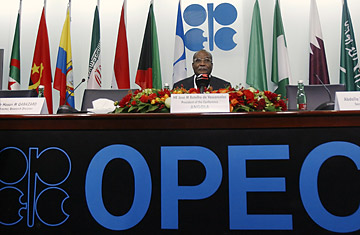
OPEC President José Maria Botelho de Vasconcelos, Angola's oil minister, prepares for a news conference
It's become a predictable September ritual: officials from the world's oil-rich nations fly into Vienna for their annual OPEC meeting, huddle around a gleaming conference table and decide how to push oil prices up or down by closing or opening the spigots on their vast resources — about two-thirds of the world's total reserves. At this week's meeting, however, OPEC's oil ministers attempted an even trickier acrobatic act: staying in place.
During the oil markets' wild ride last year, prices hit an all-time high of $147 a barrel in July before crashing to slightly more than $30 a barrel in December. Now oil futures hover around $70 a barrel — a price that is, finally, just right, according to Ali Al-Naimi, oil minister from Saudi Arabia, which produces about one-third of all OPEC oil. "The market is in very good shape," he told Reuters when he arrived in Vienna on Wednesday, Sept. 9.
But holding prices steady might be OPEC's toughest act yet. Oil analysts list a few key factors that OPEC leaders will find all but impossible to control and that could complicate efforts by the U.S. and Europe to kick-start a global economic recovery:
OPEC's Bad Boys
In theory, 11 of OPEC's 12 members are obligated to follow production quotas, including the sharp cuts voted on last December, which helped to double world oil prices within a few months (only Iraq is exempted, because of the war there). OPEC quotas are crucial to propping up world oil prices; without them, oil futures would currently trade at between $25 and $30 a bbl., according to Edward Morse, head of economic research at Lewis Capital Markets in New York. But in reality, some OPEC leaders simply ignore their quotas, because they need every penny they can earn from oil. Among the bad boys: Venezuelan President Hugo Chávez and Iranian President Mahmoud Ahmadinejad, whose oil revenues offset the impact from Western sanctions and help finance their vote-getting social programs. Angolan officials this month told OPEC they needed an exemption from their quota of 1.5 million bbl. a day, since companies like Chevron and Total have invested billions in drilling off Angola's coast, and the country — most of whose people live in dire poverty — could potentially pump about 2.3 million bbl. a day by year's end. "They argue that they are a war-torn country, like Iraq, and need to rebuild the country," Morse says. "OPEC swept the problem under the table, because, after all, why deal with it when you can put it off?"
Russia
OPEC has no control over one very important energy powerhouse: Russia. Russia's Energy Ministry reported this week that for the first time, the country's exports (about 7.4 million bbl. a day) outstripped those from Saudi Arabia, which has the world's biggest oil reserves. Saudi Arabia cut its production last year in order to prop up world oil prices and is easily the bigger potential oil producer. But oil analysts say that by ignoring OPEC's calls for production cuts, Russia has shown OPEC how little power it wields over non-OPEC producers. Although Russian officials told an OPEC summit last December that they too would cut production, the country "has repeatedly failed to do so, and the Russian government has done absolutely nothing to exert its influence" on oil companies, says Julian Lee, senior analyst at the Center for Global Energy Studies in London.
Recession or Recovery?
In a major report on oil demand this week, IHS Cambridge Energy Research Associates, which monitors global oil markets, said the world would use about 900,000 more bbl. of oil a day next year than this year and by 2012 would fully recover to its 2007 prerecession levels. OPEC is also betting on a fast global recovery. Angola's oil minister, José Maria Botelho de Vasconcelos, the current rotating OPEC head, told the meeting attendees in Vienna on Wednesday that "the darkest days of financial turmoil and economic recession are behind us." That belief has helped to persuade OPEC leaders that they can keep oil prices high without risking a demand collapse — as happened last year.
But predicting a global recovery is difficult. "Expectations are that the worst of the recession is over, but who can be sure of that?" says Edward Chow, senior fellow in the Energy and National Security Program at the Center for Strategic and International Studies in Washington. "The global economy is on a sugar high because of the stimulus spending." If the recession lags, oil prices could plummet again, discouraging oil companies from investing in exploration and new drilling and discouraging governments from introducing new alternative-energy programs.
Speculators
OPEC leaders have repeatedly called for limits on speculation in oil-futures markets, in which investors bet on which way oil prices will go. Oil officials blame speculators for volatile prices, and some financial analysts agree. "It is market psychology which is propping up prices," Morse says. If investors believe that the recession is near an end and that demand will soar, they could pour money into oil futures and drive up world prices. The Commodity Futures Trading Commission in Washington is weighing new rules that would limit how much money a hedge fund or investor can trade in oil (or any other commodity). In an article in the Wall Street Journal in July, British Prime Minister Gordon Brown and French President Nicolas Sarkozy appealed for new limits on oil speculators in order to curb "dangerously volatile" prices. That idea is expected to be debated during the G-20 meeting in Pittsburgh, Pa., later this month.
All this means that OPEC leaders struggling to control the actions of their members — let alone those of competitors like Russia or independent investors — will find keeping prices steady harder and harder.
